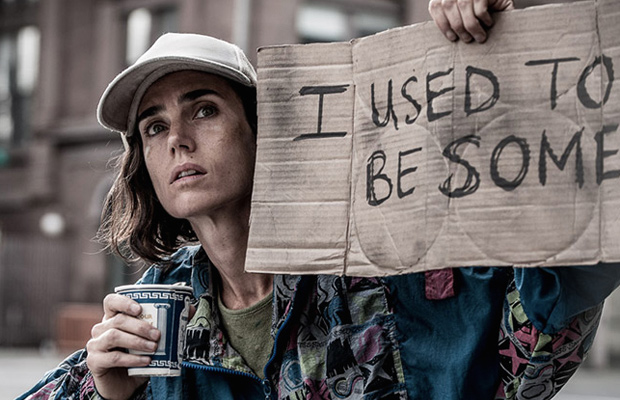Reviews
Shelter | Review
A Hard Knock Life: Bettany’s Naive Debut Exudes Good Intentions
 Actor Paul Bettany makes his directorial debut with Shelter, meant to be a glimpse into the terrible degradation of the homeless population in New York. Glossy casting and a certain ignorance conveyed in its melodramatic narrative sensationalizes subject matter meant to be sobering, and thus opens up the simple title to all kinds of ironic interpretations of Bettany’s privileged, arguably clueless perspective about a human predicament otherwise passionately presented.
Actor Paul Bettany makes his directorial debut with Shelter, meant to be a glimpse into the terrible degradation of the homeless population in New York. Glossy casting and a certain ignorance conveyed in its melodramatic narrative sensationalizes subject matter meant to be sobering, and thus opens up the simple title to all kinds of ironic interpretations of Bettany’s privileged, arguably clueless perspective about a human predicament otherwise passionately presented.
At the end credits, the film is dedicated ‘to the homeless couple who lived outside of my building,’ and there’s something incredibly moving about Bettany’s accomplishment, even if we are aware of a certain naiveté in every single frame and the possibility the director/screenwriter did not engage with his subjects directly for a prolonged period. Bettany uneasily unites sordid realism with tropes we’re accustomed to seeing conveyed in tearjerker social issue dramas churned out during the studio era, as if to shock us into believing this treatment is hard edged when all its jagged corners have been wrapped in eiderdown.
Tahir (Anthony Mackie) is an ailing Nigerian immigrant living on the streets of New York. He’s released after an arrest, the authorities finding him not even worth the time and effort to deport. Returning to his usual haunts, he finds his belongings have been stolen, but he spies another homeless woman, Hannah (Jennifer Connelly), who has his old coat. Approaching her to reclaim his item, the two begin a tentative friendship which turns quickly into a romantic entanglement. Though both of them are running from significant personal demons, Tahir does what he can to assist Hannah as she battles her heroin addiction. But a perilous health condition and lack of access to proper medication brings them to tragic circumstances on the wintry streets of a sleepless city.
In Leo Tolstoy’s Anna Karenina, the iconic protagonist comments, “I often think that men don’t understand what is noble and what is ignorant, though they always talk about it.” It’s a quote capturing the problematic essence of Shelter, a nobly made endeavor shackled to ignorant flourishes. Curiously, Bettany casts his strikingly beautiful wife, Jennifer Connelly into her most degrading moments since Aronofsky’s unforgettable finale in Requiem for a Dream (2000), injecting her tender bits with hypodermic needles and treated to a demeaning facial, followed by an uncomfortable interaction about how she’s reminiscent of someone’s daughter. But Connelly is, undoubtedly, a superb performer, and she manages some incredibly emotional sequences as Hannah. She nearly commands us into believing a homeless heroin addict can look so enviously chic, and it’s a compelling turn, not unlike the melancholy woes of beautiful Greta Garbo in Eugene O’Neill’s Anna Christie (1930).
As the film’s only other major character, Anthony Mackie provides solid support, African accent and all (not unlike Will Smith’s Nigerian riff in Concussion). He’s less emotionally potent than Connelly, by a long shot, and their ramshackle romance never manages to be believable beyond a bit of creature comfort, though Bettany is clearly trying to bolster their connection with more spiritual, meaningful connection. But it is a welcome reprieve from a slew of throwaway supporting roles in big budget popcorn flicks Mackie has been drawn to for the past several years. In comparison to his earlier, more relevant performances, this is probably his best two-hander since 2010’s Night Catches Us.
As far as recent depictions of the homeless experience go, Oren Moverman’s exceptional Time Out of Mind manages to present a visually resonant experience of bewilderment while conveying the incredible difficulty in attempting to reclaim a position in society after drifting off the grid—and that’s despite the showy casting of Richard Gere. But Shelter only presents a portrait of the emotionally unhinged relocated to the street, granting his salvageable characters backstories meant to ‘explain’ their current degradation (one of Connelly’s cardboard signs reads “I used to be somebody,” but something more universal and provocative would have been a sign reading “I am somebody”), though their personal miseries are both so overwrought they’d make Lars Von Trier blush.
It doesn’t help to have the invisible olive branch of Hannah’s father readily within reach, as it only deflates our sympathies for Shelter since she seems like the subject of the Pulp song “Common People,” because if she really wanted to get off the street she could call her dad and he’d stop it all.
★★/☆☆☆☆☆
Los Angeles based Nicholas Bell is IONCINEMA.com's Chief Film Critic and covers film festivals such as Sundance, Berlin, Cannes and TIFF. He is part of the critic groups on Rotten Tomatoes, The Los Angeles Film Critics Association (LAFCA), the Online Film Critics Society (OFCS) and GALECA. His top 3 for 2021: France (Bruno Dumont), Passing (Rebecca Hall) and Nightmare Alley (Guillermo Del Toro). He was a jury member at the 2019 Cleveland International Film Festival.






























